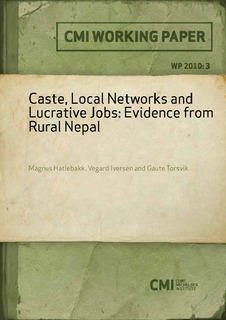| dc.contributor.author | Hatlebakk, Magnus | |
| dc.contributor.author | Iversen, Vegard | |
| dc.contributor.author | Torsvik, Gaute | |
| dc.date.accessioned | 2010-04-06T06:56:40Z | |
| dc.date.accessioned | 2017-03-29T09:13:17Z | |
| dc.date.available | 2010-04-06T06:56:40Z | |
| dc.date.available | 2017-03-29T09:13:17Z | |
| dc.date.issued | 2010 | |
| dc.identifier.isbn | 978-82-8062-289-1 | |
| dc.identifier.issn | 1890-5048 | |
| dc.identifier.uri | http://hdl.handle.net/11250/2436087 | |
| dc.description.abstract | We study how local connections to persons in influential positions affect access to lucrative international migrant jobs and attractive government employment. In rural Nepal, it would not be surprising if social status, captured by a household’s caste but also by wealth or
education, strongly influenced or perhaps even exclusively determined the access to attractive labour market opportunities. This is not the case. Although much of the variation in migration can be attributed to wealth, education and social identity, household networks have a separate impact on external employment. Well-connected households are more likely to get government jobs and appear to have favorable access to the manpower agencies and the
informal loans required to finance migration to the Persian Gulf or Malaysia. | |
| dc.language.iso | eng | |
| dc.publisher | Chr. Michelsen Institute | |
| dc.relation.ispartofseries | CMI Working paper | |
| dc.relation.ispartofseries | WP 2010: 3 | |
| dc.subject | Migrant workers | |
| dc.subject | Nepali | |
| dc.subject | Persian Gulf | |
| dc.subject | Malaysia | |
| dc.title | Caste, local networks and lucrative jobs: Evidence from rural Nepal | |
| dc.type | Working paper | |
